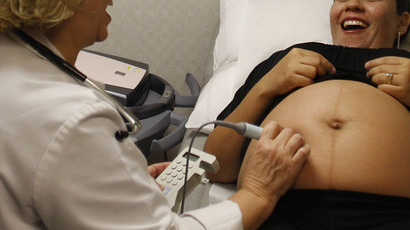Dying to give birth: Maternal mortality rate on the rise in US

The maternal mortality rate across most of the US increased by 27 percent from 2000 to 2014, new study finds, adding that the rate is actually higher than official estimates because states do not uniformly report pregnancy status on death certificates.
The last calculation of the US maternal mortality rate occurred in 2007, when it was 12.7 deaths per 100,000 live births. According to researchers responsible for the study published in the journal Obstetrics & Gynecology, that figure is too low because the estimate was made without accurate data. At the time, not all US states had adopted a "pregnancy question" on their standard death certificates, which became an accepted addition to forms in 2003.
'A national embarrassment': Maternal mortality rate rises in the U.S.: https://t.co/6RF1TSrM3r via @commonhealthpic.twitter.com/oVN9UYUMw5
— WBUR (@WBUR) August 11, 2016
Maternal mortality is defined as the "death of a woman while pregnant or within 42 days of termination of pregnancy from any cause related to or aggravated by the pregnancy or its management."
Outside of California and Texas – which were not included because their trends were "markedly different" from other states and would have skewed the results – the actual maternal mortality rate in the US in 2007 was 21.3 deaths per 100,000 live births, the researchers found, a 68 percent increase from the official reported average.
Based on their research, the team said the 2014 rate in 48 states and the District of Columbia has gone up to 23.8 deaths per 100,000 live births.
"It is an international embarrassment that the United States, since 2007, has not been able to provide a national maternal mortality rate to international data repositories," the researchers wrote. "This inability reflects the chronic underfunding over the past two decades of state and national vital statistics systems. Indeed, it was primarily a lack of funds that led to delays (of more than a decade in many states) in the adoption of the 2003 revised birth and death certificates."
The research team used a "correction factor" to analyze incomplete or unrevised maternal mortality data to adjust for the lack of uniform reporting of pregnancy status on death certificates. The adjusted figures were then used to calculate the maternal morality rates for US states, except for California and Texas. The Golden State showed a significant decline in maternal mortality rate from 2003 to 2014, while the rate in the Lone Star State doubled in 2011-2012.
While international maternal mortality rates were trending down, the US has gone in the opposite direction, researchers pointed out. They noted the World Health Organization has said that 157 of 183 nations have reported decreases in their rates since 2000. The current estimated rate in the US, however, is comparable to Iran and Ukraine, and is second-to-last only to Mexico among the so-called industrialized nations.
Just a myth? Women in the US lag behind on human rights, UN reports https://t.co/DfmLx2eFEapic.twitter.com/rp935hoR3K
— RT America (@RT_America) December 12, 2015
"The current maternal mortality rate places the United States far behind other industrialized nations,"said study co-author Eugene Declercq, professor of community health sciences at Boston University School of Public Health. "There is a need to redouble efforts to prevent maternal deaths and improve maternity care for the four million US women giving birth each year."
The study — Recent Increases in the US Maternal Mortality Rate: Disentangling Trends From Measurement Issues — was published online in the journal Obstetrics & Gynecology, and was conducted by researchers with the Boston University School of Public Health, the Maryland Population Research Center at the University of Maryland, and the California Maternal Quality Care Collaborative at Stanford University Medical School.















